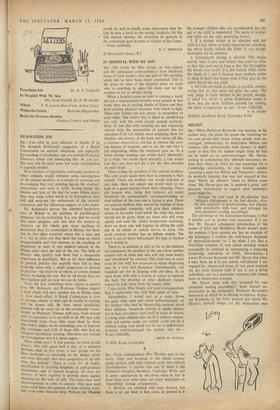IN HOSPITAL WITH MY SON
S1R,—The article by Miss Quigly on this subject and the subsequent correspondence have interested many of your readers, but one part of this problem seems not to have been much considered. This is the point of view of the hospital nurse or sister who is unwilling to open the doors and let the
mothers in for an all-day sitting.
When a hospital nurse or sister is running a ward, she has a responsibility towards every patient in that ward; they are in varying depths of illness and they have varying physical resources with which to fight. These two factors are not always in proportion to each other. The sister's day is filled to overflowing not only with the work people outside normally think of, but alsb with carrying out and organising clinical tests, the preparation of patients due for operation (I do not simply mean preparing them for theatre), and always, at the back and above all this, a constant observation; one has to observe the vary- ing degrees of response and to see the one who is not responding, whilst the treatment goes on. As a nurse during training one works hard physically; as a sister one works hard mentally. I can assure you that one does nor do a job like this standing on one's head.
There is then the problem of the anxious mothers. The only single factor they have in common is their anxiety. There are mothers one would welcome at any time, there are others one would wish to see kept at a good distance from their offspring. There arc women who, being first 'anxious, are easily hysterical or unreasonable, uncomprehending or even defiant of the cart one is trying to give. There are anxious mothers who, moved by feelings of deep but misguided sympathy, will give their children sweets or favourite food which the sister has asked should not be given, there are those who will weep openly and send the child's temperature rocketing, there are those who will frighten by telling the child not to be afraid of unholy terrors in store. The good, anxious mother has an infinite variety, The sister is not to know beforehand the type of mother she is letting in.
There is, in addition to this, so far as the children are concerned, the problem of the one whose mother cannot visit so often and who will feel more lonely and 'abandoned' by contrast. This child may in some cases be one with low resources to whom depression may be a very real hindrance. Unfortunately, our hospitals are not in keeping with our ideas. In an open ward, with only a curtain or screen to separate the beds, the presence of other children's visitors cannot be kept away from the lonely child.
I can assure Miss Quigly and your correspondents that I understand very well their point of view.
Nevertheless, 1 would not, as a sister, throw the gates wide open and admit indiscriminately all the mothers 'who may be 'desperately anxious' about their children. Desperate anxiety is agony indeed, but it does not always lend itself to sense or reason. Looking after children who are ill is a heavy, respon- sible and serious work; one simply could not do it without caring very much not to see it undermined, however well-intentioned the parents may be.— Yours faithfully, 73 Hills Road, Cambridge
IRENE M. OVERALL


































 Previous page
Previous page